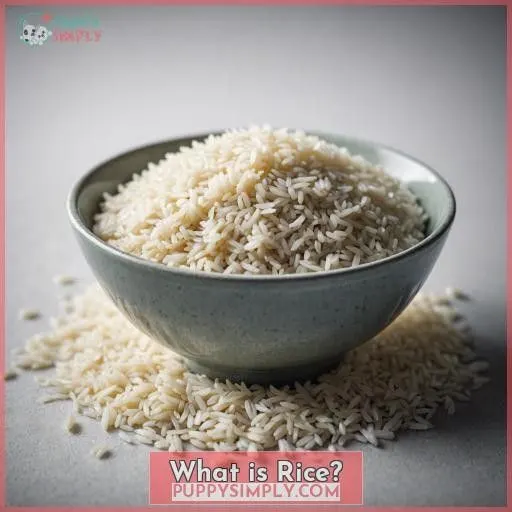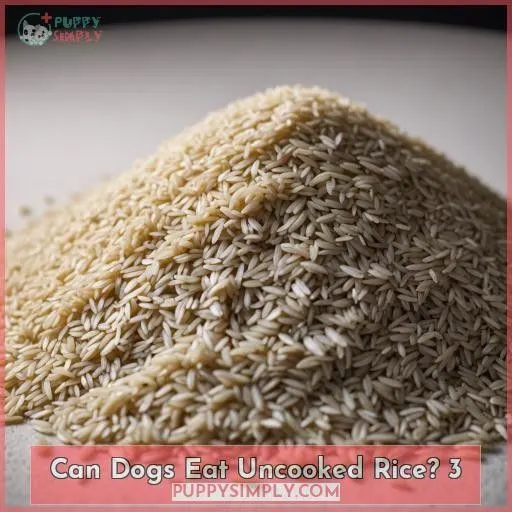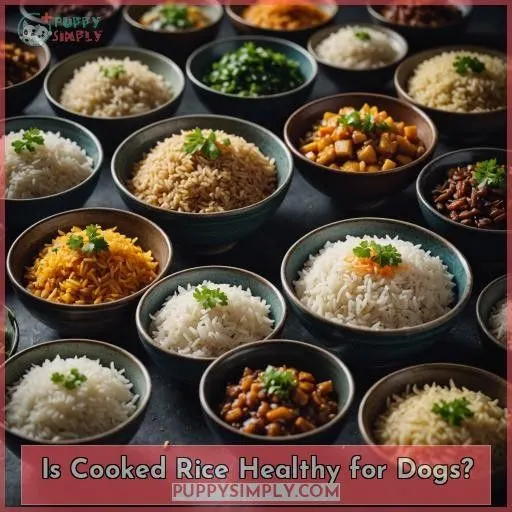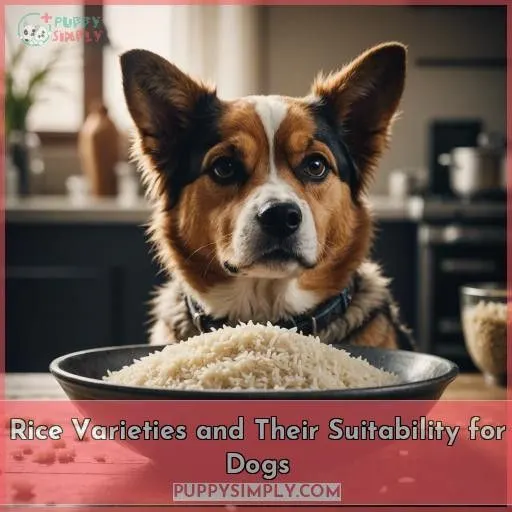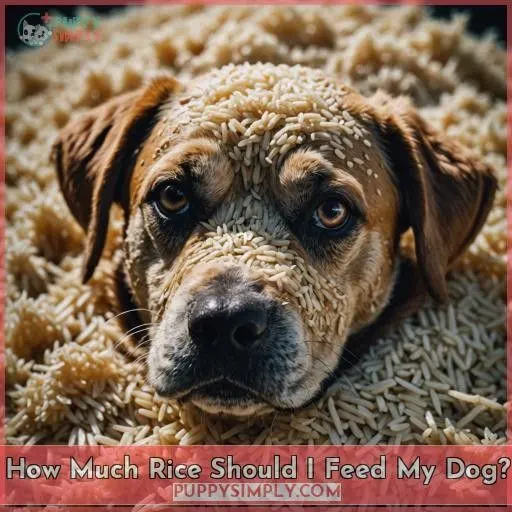This site is supported by our readers. We may earn a commission, at no cost to you, if you purchase through links.

Instead, it’s preferable to feed your dog cooked rice, which is easily digestible and can provide beneficial nutrients. However, as with any food, moderation is key, and you should consult your veterinarian before making significant changes to your dog’s diet.
If you’d like to learn more about the potential risks and benefits of feeding rice to dogs, continue reading.
Table Of Contents
- Key Takeaways
- Can Dogs Eat Uncooked Rice?
- What is Rice?
- Can Dogs Eat Uncooked Rice?
- Can Uncooked Rice Kill Dogs?
- Can Dogs Eat Cooked Rice?
- Is Cooked Rice Healthy for Dogs?
- Rice Varieties and Their Suitability for Dogs
- How Much Rice Should I Feed My Dog?
- Potential Risks of Feeding Rice to Dogs
- Frequently Asked Questions (FAQs)
- Conclusion
Key Takeaways
- Uncooked rice can pose a choking hazard and lead to gastrointestinal upset, vomiting, or diarrhea in dogs.
- While uncooked rice is unlikely to be toxic, it’s generally best to avoid feeding it to dogs, especially those with sensitive stomachs or underlying health conditions.
- Cooked rice is a safer option as it is easily digestible and can provide beneficial nutrients as part of a balanced diet.
- Moderation is crucial when incorporating rice into a dog’s diet, and consulting a veterinarian is recommended before making significant dietary changes.
Can Dogs Eat Uncooked Rice?
No, dogs shouldn’t eat uncooked rice. Uncooked rice can be difficult for dogs to digest and may cause digestive issues or intestinal obstruction.
What is Rice?
Rice is a staple grain that comes in various types, each with its own unique nutritional profile. Knowing the differences between rice varieties can help you make the best choice when feeding rice to your dog.
Types of Rice
You’re probably familiar with rice as a staple food, but did you know it comes in many varieties? Here are 3 common types:
- Brown rice – the whole grain with the nutrient-rich bran intact
- White rice – the bran is removed, making it less nutritious but more shelf-stable
- Basmati and jasmine – aromatic long-grain varieties with distinct flavors
Rice cultivation spans thousands of years and different varieties offer unique textures, aromas, and culinary uses.
Nutritional Profile of Rice
Rice is a carbohydrate-dense grain that provides energy. While it lacks protein, it contains fiber and complex carbs that can aid digestion. However, be mindful of rice sensitivity and portion size – too much can spike blood sugar. Consider cost and meal frequency when incorporating rice into your pup’s diet. Also, watch for potential arsenic toxicity from some types.
Can Dogs Eat Uncooked Rice?
Uncooked rice can pose risks to dogs if consumed, as it may cause digestive issues like irritation, vomiting, or diarrhea. While the uncooked rice itself is unlikely to be toxic, the potential for gastrointestinal upset means you should exercise caution when feeding it to your dog.
Risks of Uncooked Rice
Uncooked rice can pose some risks to your furry friend. In large quantities, it may act as a choking hazard or lead to gastrointestinal upset.
If your pup has any underlying conditions, especially related to the pancreas or digestion, avoid uncooked rice to be safe.
When preparing homemade dog food recipes, make sure to cook the rice properly to prevent potential issues.
Potential Digestive Issues
Uncooked rice can also lead to potential digestive issues in dogs. It may cause:
- Stomach irritation
- Vomiting or diarrhea
- Intestinal irritation
Though these symptoms are usually transient, it’s best to monitor your pup closely. While filler foods like uncooked rice may seem harmless, they can still trigger gastrointestinal upset in some dogs.
Can Uncooked Rice Kill Dogs?
Uncooked rice can pose a serious choking hazard to dogs, especially smaller breeds, if consumed in large quantities. It may also cause gastrointestinal upset like vomiting or diarrhea due to its indigestible nature and potential for irritating the digestive tract.
Choking Hazard
Most importantly, uncooked rice presents a serious choking hazard for dogs due to its small size and dry, hard consistency. If your pup gulps down a large volume of uncooked grains, it could severely obstruct their airway, requiring urgent medical attention. It’s best to skip uncooked rice altogether; stick with dog-safe foods that won’t cause choking or potential allergic reactions.
Gastrointestinal Upset
Uncooked rice can also cause gastrointestinal upset in dogs.
While some pups may tolerate small amounts, larger quantities can lead to vomiting, diarrhea, or even an obstruction if the rice swells up.
If your dog shows signs of rice sensitivity or intolerance, discontinue feeding it immediately and contact your veterinarian.
With rice, it is safer to stick to the cooked variety in moderation as part of a balanced diet.
Can Dogs Eat Cooked Rice?
Indeed, cooked rice isn’t just safe for dogs to eat, but it’s also highly digestible and offers carbohydrates for energy. The soft, effortlessly chewable texture of cooked rice makes it an exceptional choice for dogs recuperating from an illness or experiencing gastrointestinal distress.
Benefits of Cooked Rice
You’re right to be cautious about uncooked rice, as it poses risks. Cooked rice, however, offers fantastic benefits! It provides:
- Easily digestible carbohydrates
- Essential vitamins and minerals
- Fiber for gut health
- Low-fat nutritional value
Cooked rice can be an excellent occasional treat or part of a long-term bland diet for your pup’s wellbeing.
Digestibility of Cooked Rice
You’ll be delighted to learn that cooked rice is highly digestible for dogs, with its starch breaking down effortlessly for ideal nutrient absorption. The low glycemic index implies it won’t trigger sudden surges in blood glucose levels. Furthermore, its fiber content fosters healthy digestion and regular bowel movements – a veritable blessing for your pup’s gut well-being!
Is Cooked Rice Healthy for Dogs?
You’ll want to assess cooked rice’s carbohydrate content and vitamin/mineral profile when determining its healthiness for dogs. While it provides energy from carbs, rice also supplies essential nutrients that can benefit your pup’s overall wellbeing when fed in moderation as part of a balanced diet.
Carbohydrate Content
Cooked rice is a great source of carbohydrates for your pup. Dogs don’t have specific carbohydrate needs, but rice can provide steady energy. Just be mindful of portion sizes and monitor for any rice allergies or arsenic content concerns. Moderation is key when incorporating rice into your dog’s long-term diet for weight management.
Vitamin and Mineral Profile
Cooked rice is packed with essential vitamins and minerals that promote your dog’s health. The fiber aids nutrient absorption and digestion, while the low glycemic index and load help maintain steady blood sugar levels. Plus, the antioxidant content supports your pup’s immune system. Cooked rice is a wholesome addition to your dog’s diet.
Rice Varieties and Their Suitability for Dogs
Regarding feeding dogs rice, not all types are equivalent. Brown rice, white rice, and specialty rices like basmati and jasmine each possess distinct nutritional profiles and suitability for canine diets.
Brown Rice
Brown rice is a whole grain variety that retains the nutrient-rich bran and germ layers. With a higher nutritional value than white rice, brown rice offers:
- A rich source of protein and fiber to support your dog’s overall health.
- Antioxidants to combat free radicals and promote immune function.
- Complex carbohydrates for sustained energy.
- Potential risks of allergic reactions, so introduce slowly.
White Rice
White rice is a great option for dogs with sensitive stomachs. It’s highly digestible and easy on the gut. However, be mindful of potential rice allergies and the risk of arsenic toxicity from rice sources. Consult your vet before making white rice a regular part of your pup’s diet to make sure it agrees with their individual digestive needs.
Specialty Rices
Aside from ubiquitous white and brown rice, specialty rices offer unique nutritional profiles, flavors, and cultural significance for dog owners. Basmati rice boasts a fragrant, nutty taste, while jasmine rice has a delicate, floral aroma. These specialty rices may require different cooking methods but can make tasty, healthy additions to your pup’s diet.
- Basmati Rice
- Jasmine Rice
- Valencia Rice
- Forbidden Black Rice
How Much Rice Should I Feed My Dog?
When incorporating rice into your dog’s diet, the amount will depend on whether you’re using it as part of a bland diet or mixing it with their regular commercial food. For bland diets, aim for a 1:1 ratio of protein to rice, starting with small meals and gradually increasing as your dog’s appetite improves.
Bland Diet Recommendations
When guiding a dog back to their regular diet after gastrointestinal upset, vets often suggest a bland diet of cooked rice and boiled protein. The 1:1 rice-to-protein ratio provides readily digestible calories and nutrients to aid in soothing the gut.
Begin with small, frequent meals, and gradually enlarge portions as your dog’s appetite improves. Just ensure not to employ a bland diet long-term.
Incorporating Rice Into Commercial Diets
If your dog’s regular diet includes commercial pet food, you can supplement with small amounts of cooked rice. Rice has a moderate glycemic index, so it won’t spike your pup’s blood sugar like some grain-free alternatives. Just be mindful of the long-term impact of adding too much rice to their meals.
Potential Risks of Feeding Rice to Dogs
While rice is generally safe for dogs, it’s important to be aware of potential risks. Feeding uncooked rice can lead to allergic reactions or digestive issues, and high arsenic levels in some rice varieties may pose a concern.
Allergic Reactions
Although rice is generally safe for dogs, some pups may have allergic reactions. Keep an eye out for symptoms like:
- Skin irritation
- Gastrointestinal upset
- Lethargy
If you notice any adverse reactions, stop feeding rice and contact your vet. With some dogs, the nutritional value of rice may not outweigh the potential for allergic issues or intolerance. Your vet can help determine if rice is the right choice for your canine companion.
Digestive Problems
While uncooked rice may pass through your dog’s digestive tract without issue, it could still lead to gastrointestinal upset. Symptoms like vomiting and diarrhea may occur. If this happens, stick to a bland diet of cooked rice and boiled protein until your pup’s tummy settles. Gradually reintroduce their regular food to avoid further digestive problems.
Arsenic Toxicity
While uncooked rice is generally safe, it’s important to be mindful of potential arsenic risks. Rice can naturally contain varying levels of this heavy metal, and absorption rates can differ. Monitor your pup closely for any concerning health implications. When in doubt, it’s always best to play it safe with your canine companion.
3 Key Arsenic Risks in Rice for Dogs:
- Bioavailability Variations: Rice can contain differing amounts of arsenic, posing varying degrees of risk.
- Absorption Rates: Dogs may absorb arsenic from rice at different rates, depending on factors like age and health status.
- Health Implications: Chronic arsenic exposure can lead to serious issues, so exercise caution when feeding rice to your furry friend.
Frequently Asked Questions (FAQs)
Can dogs eat rice cakes or rice crackers?
Did you know dogs can eat up to 10% of their diet in the form of rice cakes or crackers? However, moderation is key, as they’re high in starch and may cause gastrointestinal issues if consumed in excess.
Is it safe to feed dogs jasmine or basmati rice?
Jasmine and basmati rice are safe for dogs to eat. These aromatic rices are easily digestible and provide beneficial carbohydrates. Just be sure to cook them thoroughly before serving.
How do I transition my dog back to their regular diet?
76% of vets recommend a gradual shift back to your dog’s regular diet. Start by mixing small amounts of their usual food with the bland diet, slowly increasing the proportion over 5-7 days.
Can rice be used as a training treat for dogs?
Rice can make a great training treat for dogs. Just be sure to use cooked rice, as the uncooked variety may cause digestive upset. A small portion is perfect for rewarding good behavior.
What are the signs of rice allergy in dogs?
Signs of rice allergy in dogs include skin irritation, digestive upset, and lethargy. Watch for these symptoms if you introduce rice to your pup’s diet. Consult your vet if concerns arise.
Conclusion
Like a beacon, this article sheds light on the potential perils of feeding uncooked rice to dogs.
While it might appear innocuous, the choking hazard and digestive distress emphasize the need for vigilance.
Instead, choose cooked rice, offering a nourishing and readily digestible option for your canine companion.
Moderation is paramount, so consult with your veterinarian to ensure a balanced diet that suits your dog’s unique requirements.

